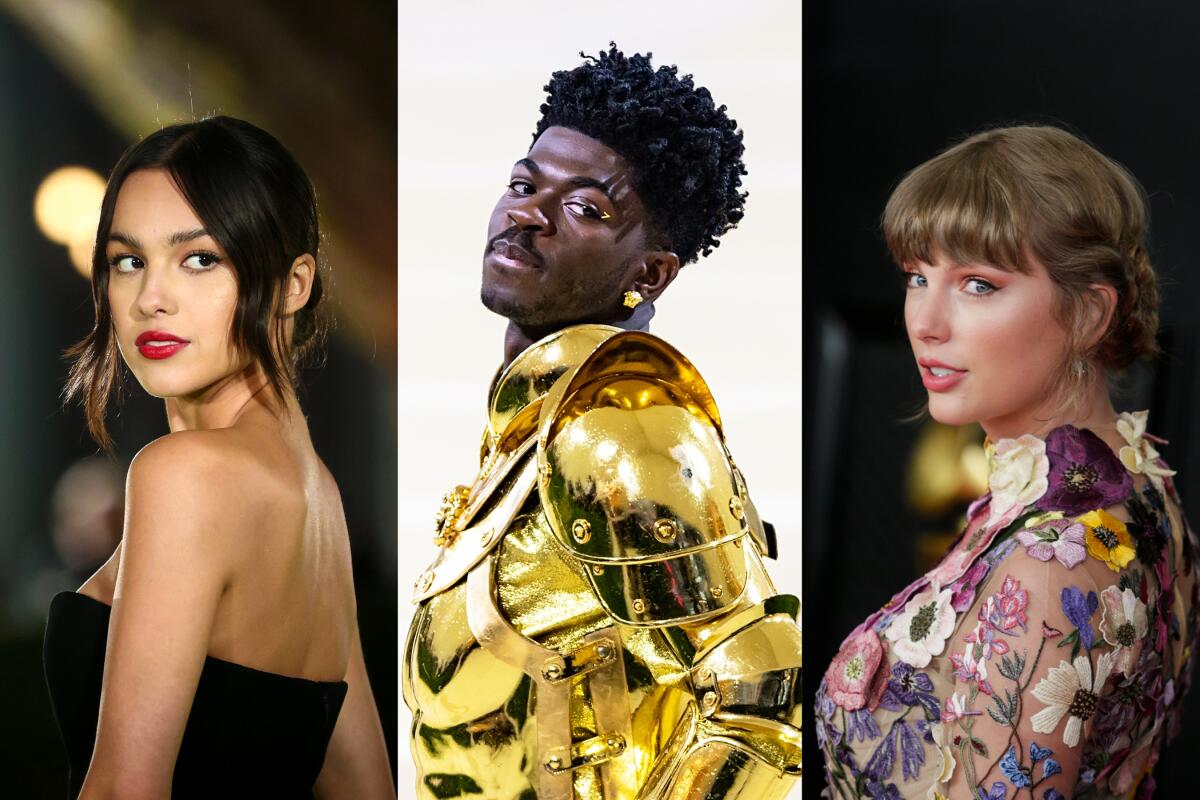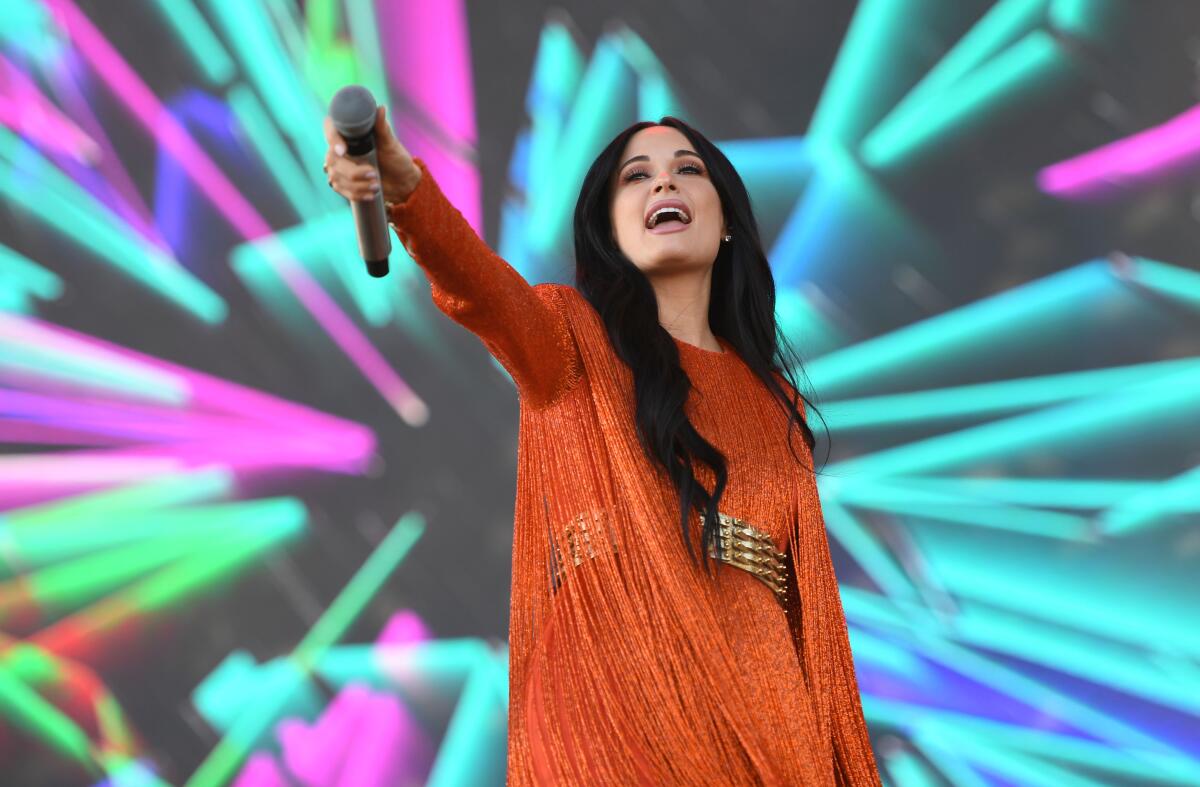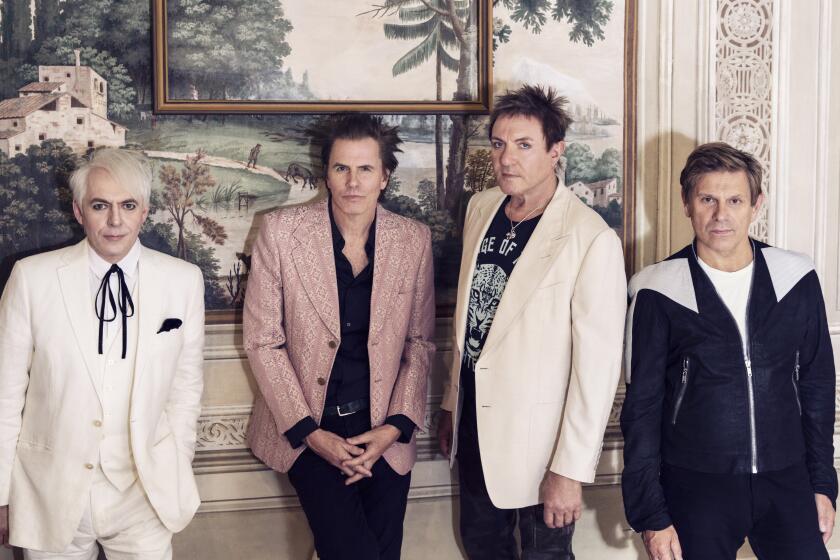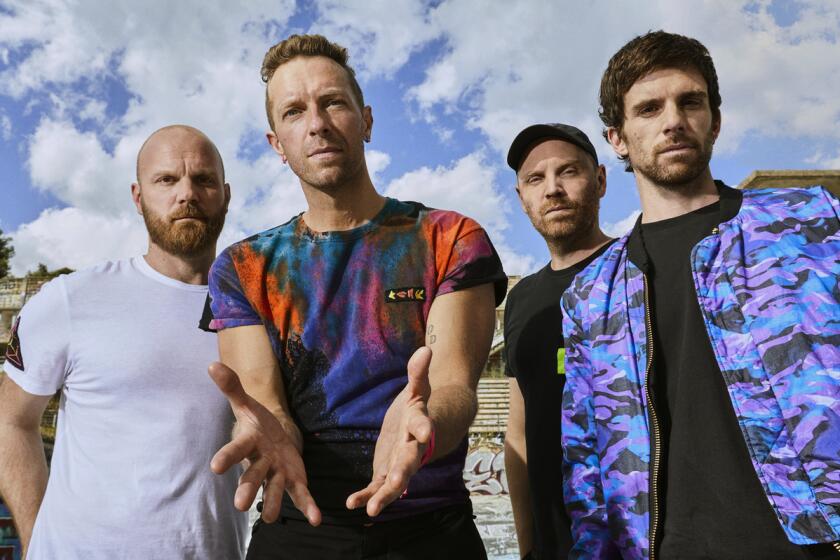As Grammy voting begins, Gen Z acts are favorites. But could a 95-year-old take the top prize?

- Share via
You can almost picture it: Tony Bennett, beaming and crinkly-eyed at age 95, shuffling slowly to the podium with help from Lady Gaga as the in-house band strikes up one of the indelible Cole Porter numbers from their latest collaborative LP. “Love for Sale,” as it’s called, has just been named album of the year, and now — before an arena full of stars, including a teary-eyed Taylor Swift, and with millions tuned in at home — it’s time for Gaga to pay tribute to her legendary friend with Alzheimer’s disease.
An improbable scenario at next year’s 64th Grammy Awards? Perhaps. But given the Recording Academy’s long-established weakness for old-timers and cross-generational hookups — think Robert Plant and Alison Krauss winning album of the year in 2009, or Herbie Hancock doing it in 2008, or Natalie Cole and her late father, Nat King Cole, in 1992 — an emotional Gaga/Bennett victory could make for an elegant solution to what feels like the lack of a clear front-runner for pop music’s most prestigious prize.
It’s the always-unpredictable Grammys, said one music-industry insider, adding with a laugh, “I could see it happening.”

With first-round voting having opened Friday, Swift, Billie Eilish, Olivia Rodrigo and Lil Nas X are all but certain to fare well in nominations set to be announced Nov. 23. (Eligible recordings had to be released between Sept. 1, 2020, and Sept. 30, 2021; the 64th ceremony itself will take place Jan. 31 in Los Angeles.) Yet for varying reasons, none of them seems like a lock for album of the year — which leaves that long-shot opening for the feel-good odd couple with the sure-to-stop-the-show acceptance speech.
For the academy, a throwback win for “Love for Sale” would also serve as a welcome reminder of a simpler era, back before the Grammys became the cultural and political flashpoint they often resemble today.
Set to release their 15th album, Duran Duran’s Simon Le Bon and John Taylor talk recovering from COVID, their favorite bad review and plastic trousers.
The 2021 ceremony, held later than usual in mid-March due to pandemic-related delays, was shadowed by allegations of corruption from the Weeknd, who publicly criticized the academy after his smash “After Hours” album failed to receive a single nod; his comments echoed those of other high-profile Black artists, including Frank Ocean and Drake, who’ve highlighted concerns about systemic racism in the Grammys’ nominating process, and of Deborah Dugan, the academy’s former CEO who was ousted in 2020 after making explosive claims regarding vote-rigging, discrimination and sexual misconduct.
In response, the academy recently announced that it was doing away with its controversial nominations review committees — small groups of music-business insiders who oversaw, and sometimes amended, the Grammys ballot after the academy’s thousands of voters had made their initial choices — and had parted ways with chief awards officer Bill Freimuth, who supervised the committees. (Many concluded it was a committee that had iced out the Weeknd as a result of some behind-the-scenes conflict.)
The news was received as a sign of longed-for transparency, though, as one prominent industry executive pointed out, a clean vote may only reveal an underlying issue. “The academy has a serious membership problem,” said this person, who, like others, requested anonymity in order to speak freely about awards they’d still like their artists to win. “There’s nowhere near as much diversity as there needs to be.” Added a veteran major-label exec: “If you’re truly relying on the voters” — a group of approximately 12,000 widely thought to be dominated by older white men — “you might end up with another Jethro Tull situation.” (In 1989, the flute-blowing British band infamously beat Metallica for the hard rock/metal performance Grammy.)
“It’s possible the committees saved the academy from embarrassment more than they created it,” this person said.

Since he took over from Dugan last year, academy chief Harvey Mason Jr. has earned reserved praise for attempting to diversify the organization’s membership. Yet the group found itself in hot water again this month when word got out that Kacey Musgraves’ pop-leaning “Star-Crossed” had been barred from consideration in the country album category, ostensibly because it’s not country enough. The ruling — made by a so-called screening committee that decides whether certain albums or songs qualify for certain genre awards — raised familiar questions about conflicts of interest inside the academy and newer ones about who’s tasked with policing genres and who loses in that process.
Mason declined a request to discuss the criticism from the Weeknd and from Cindy Mabe, the president of Musgraves’ record company, who detailed her grievances in a widely circulated letter to Mason. But through a spokesman, he told The Times that “every aspect of the Grammy Awards process is driven by rank-and-file music people who volunteer their time” and said he’s “always disappointed when a prominent, accomplished artist or their representatives lash out in anger at their fellow music people.”

With all that said, who’s in the hunt for coveted nominations now that folks have started filling out their ballots? Rodrigo, the 18-year-old pop phenom who broke out in January with her smash power ballad “Drivers License,” stands a good chance of landing nods in all four major categories: album, record and song of the year, as well as best new artist. She’s likely to go on to win best new artist and either record or song, though album could be a stretch for old-fashioned voters suspicious of Rodrigo’s past as a Disney Channel star.
Swift and Billie Eilish are virtually guaranteed album nominations — one perk of having previously won that award (as Swift has three times, including this year, and Eilish did in 2020). Yet Swift’s “Evermore” is basically a lighter-weight sequel to last year’s “Folklore,” which may turn off voters when it comes to picking winners, while Eilish’s sarcastically titled “Happier Than Ever” has nothing but scorn for the pop-star experience the Grammys typically celebrate.
“That’s why Olivia is the favorite — she’s actually happy,” said one seasoned insider, contrasting Rodrigo with the gloomier likes of Eilish, Lorde and Lana Del Rey, all of whom made critically admired records about the heavy burdens of fame. “She’s like, ‘I broke up with my guy, but yay!’”
The whole point of Coldplay has been voicing the big, cringe-y emotions other musicians are too cool to voice. ‘Music of the Spheres’ is no exception.
Other possible-to-likely album nominees include Drake’s “Certified Lover Boy,” Musgraves’ “Star-Crossed,” country singer Chris Stapleton’s “Starting Over,” pop-rap hit-maker Doja Cat’s “Planet Her,” H.E.R.’s R&B disc “Back of My Mind” and Lil Nas X’s “Montero,” the last of which would almost certainly be the most proudly queer LP ever to score a nod for the Grammys’ flagship trophy. Among those on the bubble are streaming behemoths from two problematic figures — Kanye West’s “Donda” and Morgan Wallen’s “Dangerous: The Double Album” — along with Justin Bieber’s “Justice,” the Gaga/Bennett album, “Good News” by former best new artist winner Megan Thee Stallion and “Remember Her Name” by Mickey Guyton, who became the first Black female country artist to perform on the Grammys when she brought the house down with “Black Like Me” during March’s ceremony.
Tyler, the Creator, who made waves in 2020 when he questioned why his “Igor” won the rap album prize despite the fact that it contained little rapping, could also turn up with his densely lyrical “Call Me if You Get Lost.”

For record and song — the former honors performers and producers, while the latter is a songwriters’ prize — expect to see Rodrigo’s “Drivers License,” Lil Nas X’s “Montero (Call Me by Be Your Name),” Swift’s folky “Willow” and the retro-soul “Leave the Door Open” by Bruno Mars and Anderson .Paak’s duo, Silk Sonic. Bieber is likely to show up in these categories as well, with his chart-topping “Stay” duet with the Kid Laroi, his slinky “Peaches” featuring Daniel Caesar and Giveon and/or his stripped-down ballad “Lonely.” Eilish, who took the record award in March for the second year in a row, might be in the running for a third with “Happier’s” title track. (Adele’s chart-topping comeback single, “Easy on Me,” came out too late to be eligible.)
Brandi Carlile, a proven Grammy fave with six awards to her name, could score a nod with “Right on Time,” whose title she made good on with an attention-getting performance this past weekend on “Saturday Night Live”; so could Bo Burnham, the stand-up comic whose much-discussed Netflix special “Inside” spawned a viral hit in the apocalyptic campfire song “That Funny Feeling,” which Phoebe Bridgers has been covering on the road. Look out as well for a possible showing by K-pop’s BTS, whose “Butter” may finally receive the record nod many thought the boy band was due last year for the inescapable “Dynamite.”

Among Rodrigo’s competition for best new artist are singsongy rappers (Saweetie, Polo G, the Kid Laroi), introspective tunesmiths (Arlo Parks, Joy Oladokun), a nerdy indie-rock band with a TikTok smash (Glass Animals with “Heat Waves”) and a flamboyant Italian rock band with a left-field radio hit (Måneskin with its take on the Four Seasons’ “Beggin’”).
As for the Grammys show itself, the academy announced this week that executive producer Ben Winston, who took over the telecast this year after four decades with Ken Ehrlich at the helm, would oversee the 2022 edition, albeit with a new showrunner in Raj Kapoor.
Ratings for March’s ceremony, which took place in and around the L.A. Convention Center in accordance with COVID-19 guidelines, declined to the lowest on record for the Grammys — a trend common to virtually every other televised awards show — though reviews were almost universally positive. In a statement, the academy said January’s production would return to its longtime home of Staples Center.
More to Read
The biggest entertainment stories
Get our big stories about Hollywood, film, television, music, arts, culture and more right in your inbox as soon as they publish.
You may occasionally receive promotional content from the Los Angeles Times.













